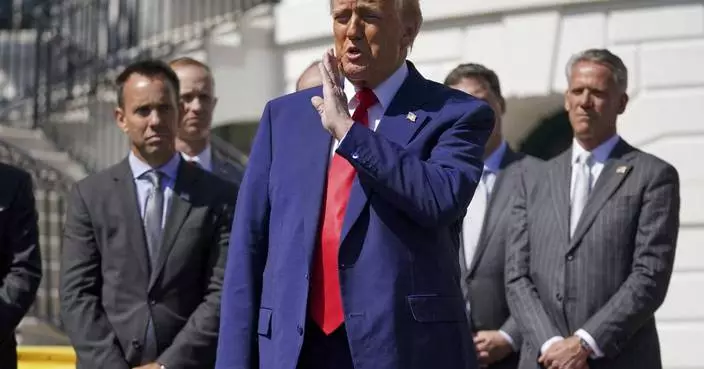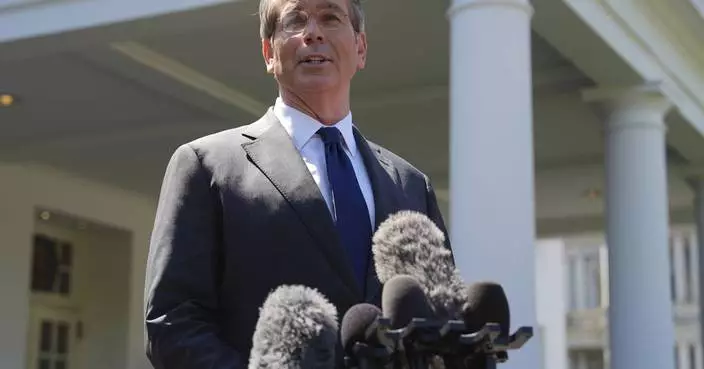Nations are trying to reach an agreement to charge commercial vessels a fee for their emissions in what would effectively be the world’s first global carbon tax.
The International Maritime Organization, which regulates international shipping, set a target for the sector to reach net-zero greenhouse gas emissions by about 2050, and committed to ensuring that fuels with zero or near-zero emissions are used more widely. Its Marine Environment Protection Committee meets Monday through Friday in London.
Click to Gallery
Ships are loaded at the Port of Los Angeles Wednesday, April 2, 2025, in Los Angeles. (AP Photo/Damian Dovarganes)
Cranes and shipping containers are seen at a port in Pyeongtaek, South Korea, Wednesday, April 2, 2025. (AP Photo/Ahn Young-joon)
A container ship departs from the port of Santos in Brazil, Tuesday, April 1, 2025. (AP Photo/Andre Penner)
Shipping containers line the Ever Most cargo vessel docked at the Port of Oakland on Thursday, April 3, 2025, in Oakland, Calif. (AP Photo/Noah Berger)
A container ship approaches the port of Santos in Brazil, Tuesday, April 1, 2025. (AP Photo/Andre Penner)
The committee, comprised of IMO member states, is working to approve proposed new global regulations to put a price on maritime greenhouse gas emissions and to set a marine fuel standard to phase in cleaner fuels.
The measures are more than climate aspirations – they will become mandatory for ships operating globally, said IMO Secretary-General Arsenio Dominguez, who thinks the industry must do more to cut carbon pollution. The committee will “set the course for a net-zero future for the maritime sector,” he told The Associated Press in a statement Thursday.
The future of clean shipping hangs in the balance, said Emma Fenton, senior director for climate diplomacy at a U.K.-based climate change nonprofit, Opportunity Green. Fenton said a high price, simple flat-rate levy on shipping’s greenhouse gas emissions is the only way to decarbonize the industry equitably.
“If an agreement is reached, it would represent a huge moment of solidarity in the fight to tackle climate change,” Fenton said. “For the first time, we will have, hopefully, an effective global framework tackling this international issue. Most emissions are tackled domestically."
Here’s what to know:
Emissions from shipping have increased over the last decade — to about 3% of the global total according to the United Nations — as vessels have gotten much bigger, delivering more cargo per trip and using immense amounts of fuel oil.
Maritime nations agreed in 2023 to slash emissions from the shipping industry, though several experts and nations were critical of the deal since it did not set 2050 as a hard date. The IMO is now in the process of adopting regulations to achieve the goals agreed to in 2023.
A simple climate levy paired with a green fuel standard would help narrow the price gap between fossil fuels and green fuels, such as hydrogen, methanol and ammonia, according to the Global Maritime Forum, a nonprofit that works closely with the industry. Shipping relies heavily on fossil fuels and the sector won't transition off those on its own, said Jesse Fahnestock, who leads the forum’s decarbonization work. And it will take time to build up a supply of e-fuels based on renewable electricity so investments need to happen now, he added.
Most ships today run on heavy fuel oil, releasing carbon dioxide and other pollutants as it's burned. Dominguez has said that major decarbonizing requires an overhaul of shipping fuel.
The Clean Shipping Coalition is calling on governments to commit to a high price on all ship emissions and a strong fuel standard. The alliance of environmental non-profits is also urging countries to revise the IMO's tool for measuring a ship's carbon intensity, to quantify and raise their efficiency transparently and drive down the amount of fuel burned long-term.
Led by Pacific island nations, whose very existence is threatened by climate change, more than 60 countries support a flat levy per metric ton of emissions to reach net zero in a fair way. The shipping industry supports a fee, too. The International Chamber of Shipping represents over 80% of the world’s merchant fleet. Its secretary general, Guy Platten, said a pricing mechanism for maritime emissions is a pragmatic solution and the most effective way to incentivize a rapid energy transition in shipping.
Some countries, notably China, Brazil, Saudi Arabia and South Africa, want a credit trading model instead of a fixed levy, where ships get credits for staying under their emissions target and ships purchase credits if they go over. Other countries want a compromise between the two models.
Some fear that anything short of a universal levy would jeopardize climate goals and allow wealthier ship owners to buy compliance while continuing to pollute. Ambassador Albon Ishoda, Marshall Islands’ special envoy for maritime decarbonization, said IMO's climate targets are “meaningless” without the levy. Revenue from a levy could be used to help developing countries transition to greener shipping, so they aren't left behind with dirty fuels and old ships.
If the committee agrees and finalizes text for the regulations, they could be formally adopted in October and take effect in 2027. That could send a powerful signal that the green transition is happening and that it's possible for a global industry, according to the IMO.
The Associated Press’ climate and environmental coverage receives financial support from multiple private foundations. AP is solely responsible for all content. Find AP’s standards for working with philanthropies, a list of supporters and funded coverage areas at AP.org.

Ships are loaded at the Port of Los Angeles Wednesday, April 2, 2025, in Los Angeles. (AP Photo/Damian Dovarganes)

Cranes and shipping containers are seen at a port in Pyeongtaek, South Korea, Wednesday, April 2, 2025. (AP Photo/Ahn Young-joon)

A container ship departs from the port of Santos in Brazil, Tuesday, April 1, 2025. (AP Photo/Andre Penner)

Shipping containers line the Ever Most cargo vessel docked at the Port of Oakland on Thursday, April 3, 2025, in Oakland, Calif. (AP Photo/Noah Berger)

A container ship approaches the port of Santos in Brazil, Tuesday, April 1, 2025. (AP Photo/Andre Penner)
WASHINGTON (AP) — House Republicans narrowly approved their budget framework Thursday, a political turnaround after Speaker Mike Johnson worked into the night to satisfy GOP holdouts who had refused to advance trillions of dollars in tax breaks without deeper spending cuts.
Johnson stood with Senate Majority Leader John Thune early in the morning at the Capitol to shore up President Donald Trump’s "big, beautiful bill,” and they committed to seeking at least $1.5 trillion in cuts to federal programs and services. The speaker had abruptly halted voting Wednesday night.
“I told you not to doubt us,” Johnson, R-La., said afterward.
He acknowledged the week's economic turmoil with the financial markets “a little unstable.” But he said the House vote was a ”big day."
The 216-214 vote pushed the budget plan forward, one more milestone for Johnson, and next step in a lengthy process to unlock the centerpiece to the president’s domestic agenda of tax cuts, mass deportations and a smaller federal government. A failed vote, particularly as the economy was convulsing over Trump’s trade wars, would have been a major setback for the party in power in Washington. Two conservative Republicans voted against it, as did all Democrats.
Trump, at a black-tie fundraising dinner this week, had admonished Republicans to "stop grandstanding” on the budget.
By Thursday morning, Trump had shifted his tone.
“Biggest Tax Cuts in USA History!!! Getting close,” Trump said.
The action still leaves weeks, if not months, ahead. House and Senate Republicans will have to turn their budget framework into bill text for a final product. Johnson can lose only a few detractors from his slim Republican majority at any vote along the way. Democrats, in the minority, lack the numbers to stop the package, but they promised to fight every step.
House Democratic leader Hakeem Jeffries of New York said the GOP budget plan was a “toxic scheme” that proposed the largest cuts to the Medicaid health care program and food assistance in the nation's history, “all in service of enacting massive tax breaks to their millionaire donors, like Elon Musk” — referring to the billionaire businessman who is leading Trump's cost-cutting efforts through the Department of Government Efficiency.
Jeffries said Democrats will push back until they “bury this budget resolution in the ground.”
Late Wednesday, the outcome was in flux. At least a dozen conservative Republicans, if not more, were firmly against the plan. Several of them, including members of the ultraconservative Freedom Caucus, made the unusual move of walking across the Capitol to meet privately with Senate GOP leaders to insist on deeper cuts.
As night fell, Johnson pulled a group of Republicans into a private meeting room as House proceedings came to a standstill. They stayed into the night hashing out alternatives, and were back at it in the morning.
Johnson said he spoke with Trump for about five minutes while the GOP meeting was taking place.
“The president is very anxious for us to get this done,” Johnson said.
But House GOP conservatives, including several of those who met with Trump this week, were concerned that the Senate GOP's blueprint, approved last weekend, did not cut spending to the level they believe necessary to help prevent soaring deficits.
“The Math Does Not Add Up,” Rep. Chip Roy, R-Texas, had posted earlier on social media.
Rep. Andy Harris, R-Md., the Freedom Caucus chair, led others to meet with the senators.
In the end, Harris, Roy and almost all the holdouts came on board. They said they were assured by Johnson, Thune and Trump that there would be steep cuts ahead. Republican Reps. Thomas Massie of Kentucky and Victoria Spartz of Indiana voted “no.”
“We got as much as we could,” said Rep. Tim Burchett, R-Tenn. ”We realized it was bigger than us."
Before the vote, Thune, R-S.D., tried to assure House conservatives that many GOP senators were aligned with their pursuit of spending reductions.
“We certainly are going to do everything we can,” Thune said.
But the details ahead will matter. Key Republican senators already signaled their disapproval of some $800 billion in House-proposed cuts that could hit Medicaid and other vital programs.
Johnson insisted that the health care and other services that millions of Americans rely on, particularly Medicare, Medicaid and Social Security, would be spared. Republicans instead are seeking to impose new restrictions on benefits and cut what they portray as waste, fraud and abuse, following DOGE's efforts.
A final product is expected later this spring or summer, with more voting to come.
Central to the budget framework is the Republican effort to preserve the tax breaks approved in 2017, during Trump's first term, while potentially adding the new ones he promised during his 2024 campaign. That includes no taxes on tipped wages, Social Security income and others, ballooning the price tag to some $7 trillion over the decade.
The package also allows for more than $500 billion in budget increases, including some $175 billion to pay for Trump's deportation operation and as much for the Defense Department to bolster military spending.
The plan would also raise the nation's debt limit to allow more borrowing to pay the bills. Trump had wanted lawmakers to take the politically difficult issue off the table. With debt now at $36 trillion, the Treasury Department has said it will run out of funds by August.
But the House and Senate need to resolve their differences on the debt limit, as well. The House GOP increases the debt limit to $4 trillion, but the Senate lifted it to $5 trillion so Congress would not have to revisit the issue again until after the midterm elections in November 2026.
To clip costs, the Senate is using an unusual accounting method that does not count the costs of preserving the 2017 tax cuts, some $4.5 trillion, as new spending, another factor that is enraging the House conservatives.
Associated Press writers Mary Clare Jalonick, Stephen Groves, Leah Askarinam and Matt Brown contributed to this report.
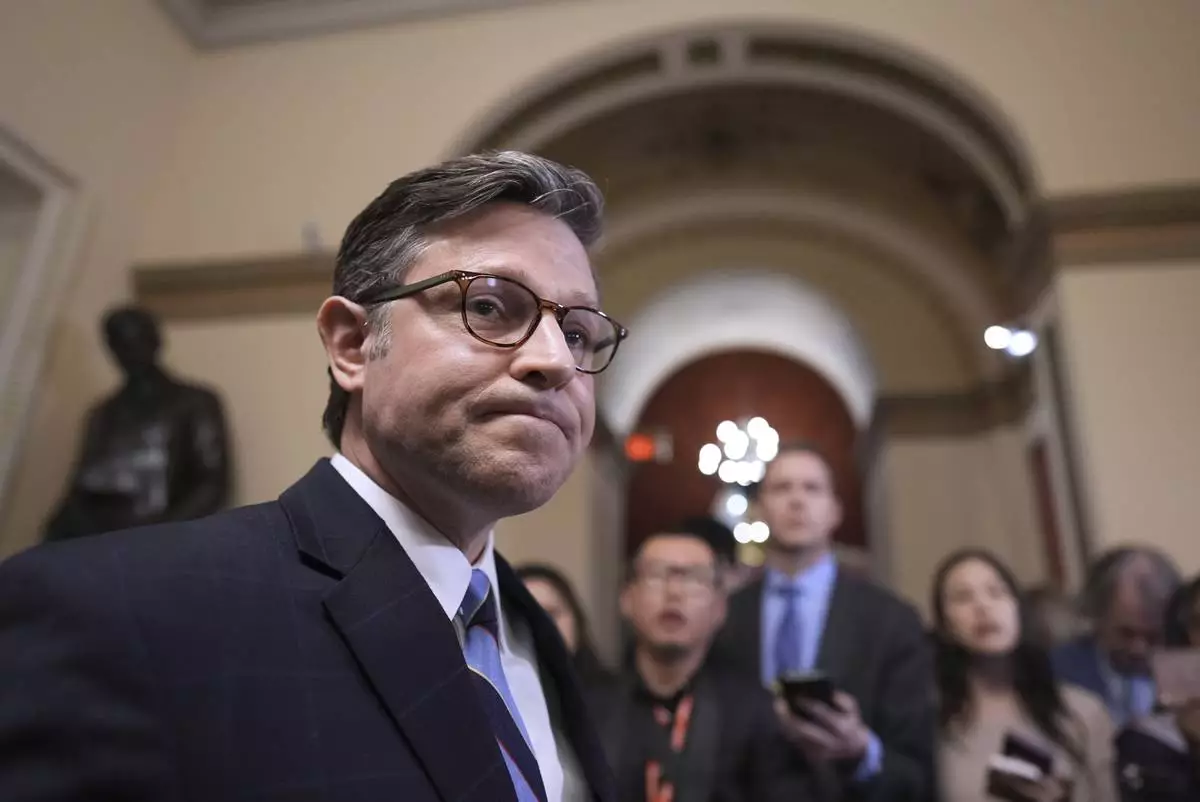
Speaker of the House Mike Johnson, R-La., talks to reporters just after House Republicans narrowly approved their budget framework, at the Capitol in Washington, Thursday, April 10, 2025. (AP Photo/J. Scott Applewhite)

Speaker of the House Mike Johnson, R-La., talks to reporters just after House Republicans narrowly approved their budget framework, at the Capitol in Washington, Thursday, April 10, 2025. (AP Photo/J. Scott Applewhite)
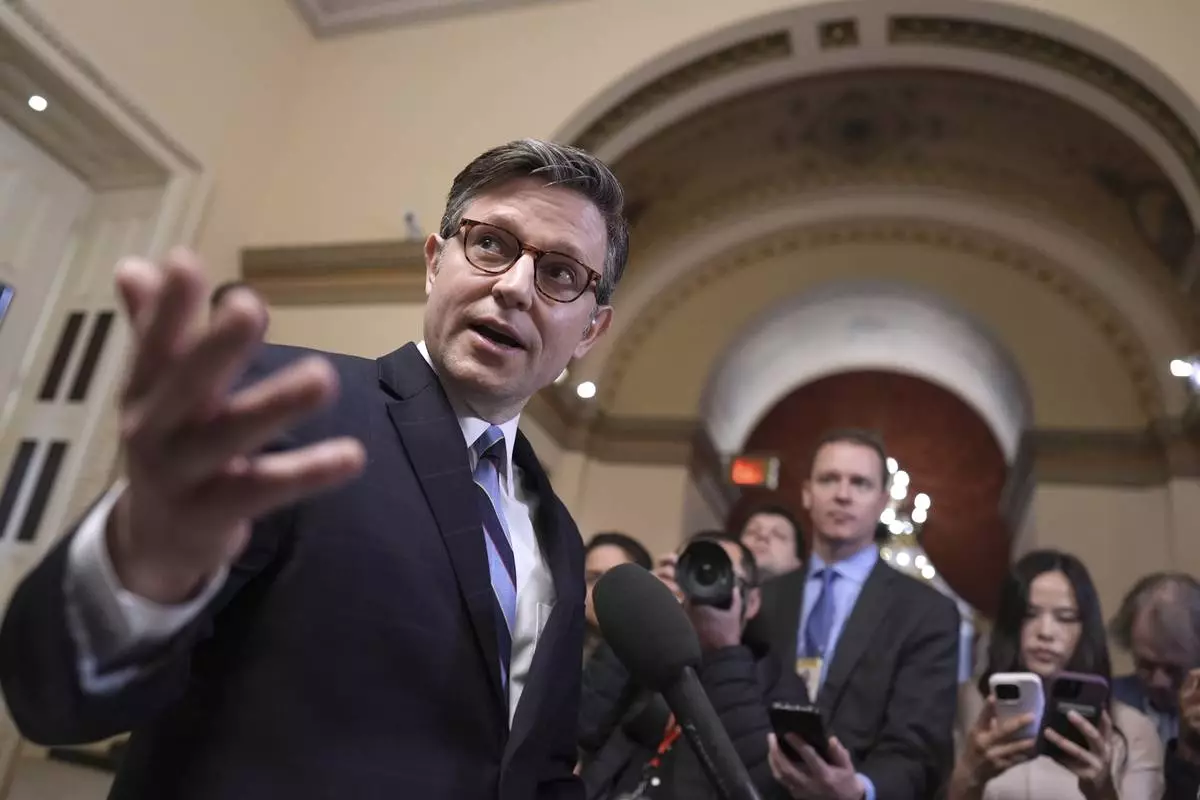
Speaker of the House Mike Johnson, R-La., talks to reporters just after House Republicans narrowly approved their budget framework, at the Capitol in Washington, Thursday, April 10, 2025. (AP Photo/J. Scott Applewhite)

Speaker of the House Mike Johnson, R-La., talks to reporters just after House Republicans narrowly approved their budget framework, at the Capitol in Washington, Thursday, April 10, 2025. (AP Photo/J. Scott Applewhite)
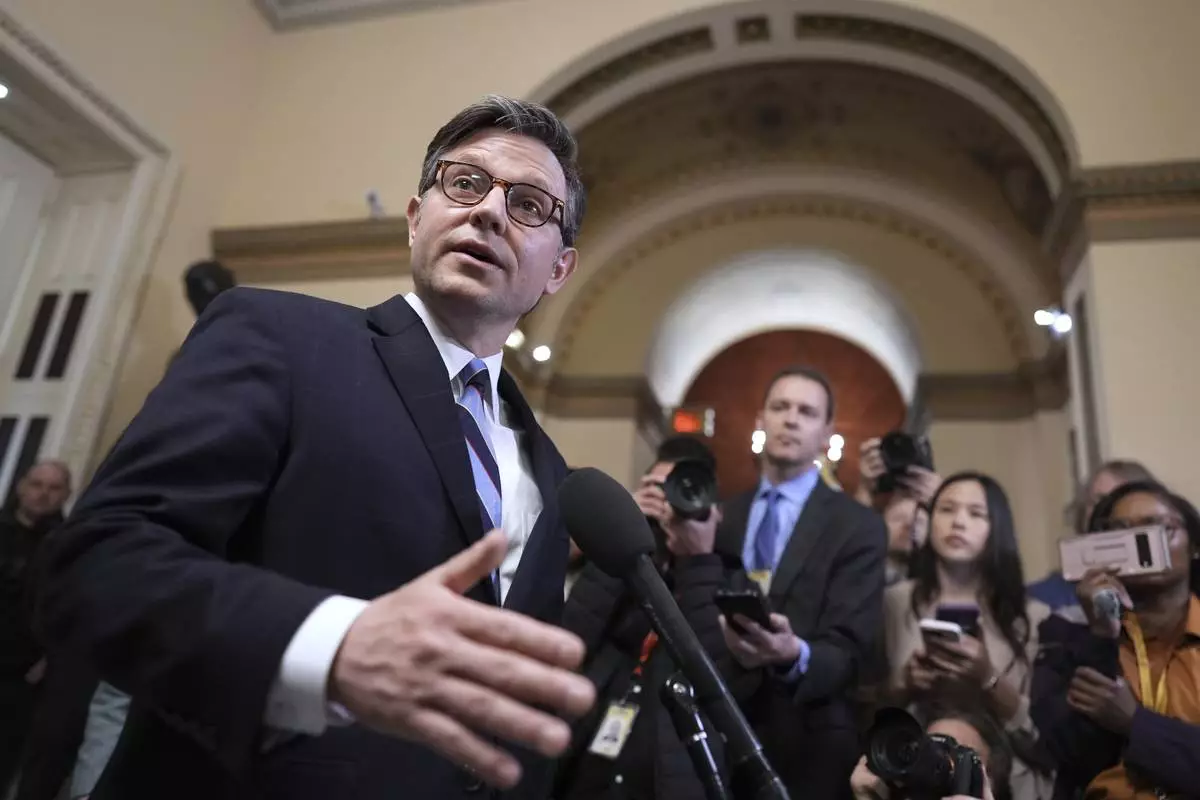
Speaker of the House Mike Johnson, R-La., talks to reporters just after House Republicans approved their budget framework that is central to President Donald Trump's agenda, at the Capitol in Washington, Thursday, April 10, 2025. (AP Photo/J. Scott Applewhite)
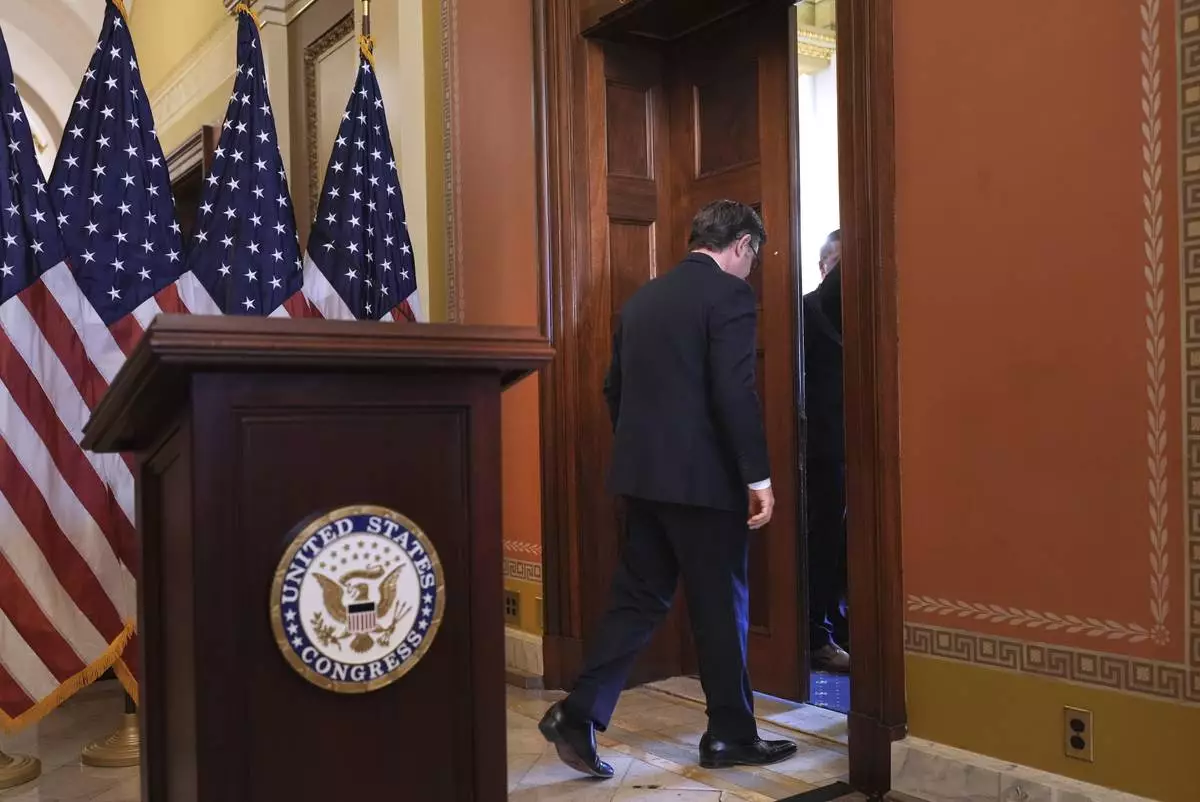
Speaker of the House Mike Johnson, R-La., departs after he and Senate Majority Leader John Thune, R-S.D., made statements to reporters ahead of a vote in the House to pass a bill on President Donald Trump's top domestic priorities of spending reductions and tax breaks, at the Capitol in Washington, Thursday, April 10, 2025. (AP Photo/J. Scott Applewhite)
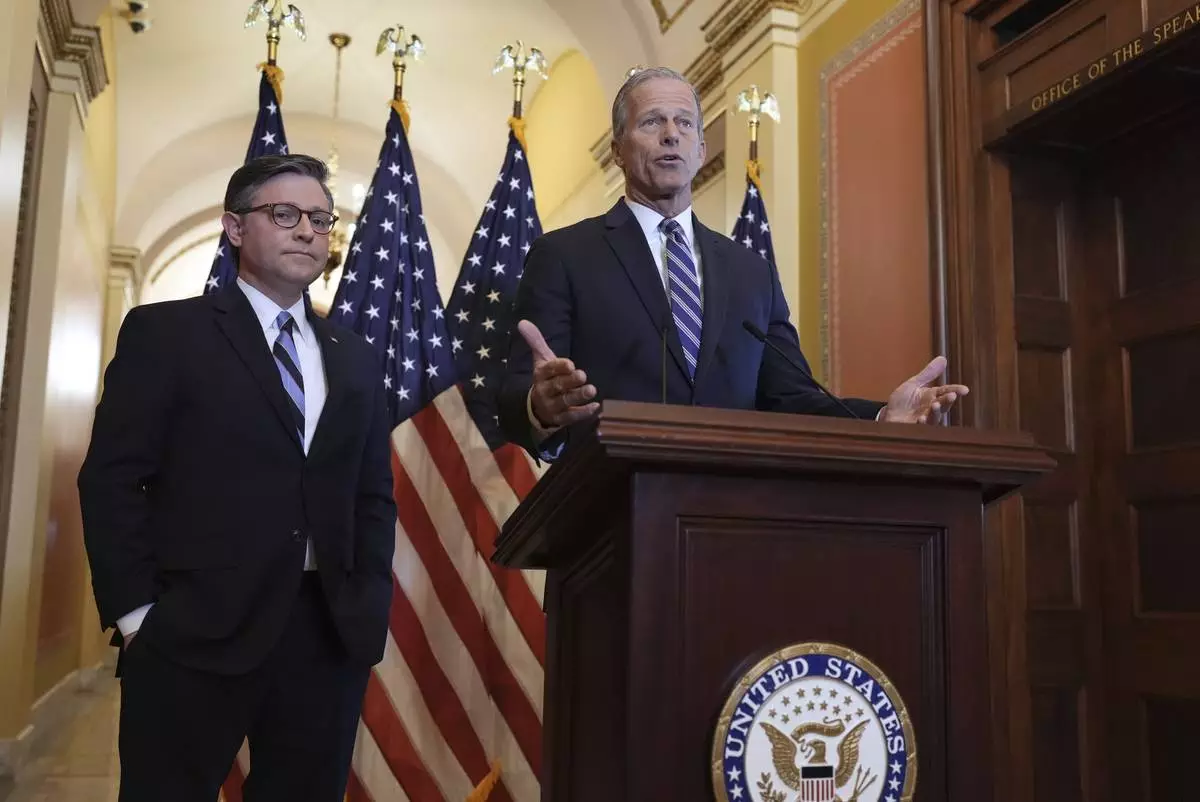
Speaker of the House Mike Johnson, R-La., left, and Senate Majority Leader John Thune, R-S.D., make statements to reporters ahead of vote in the House to pass a bill on President Donald Trump's top domestic priorities of spending reductions and tax breaks, at the Capitol in Washington, Thursday, April 10, 2025. (AP Photo/J. Scott Applewhite)
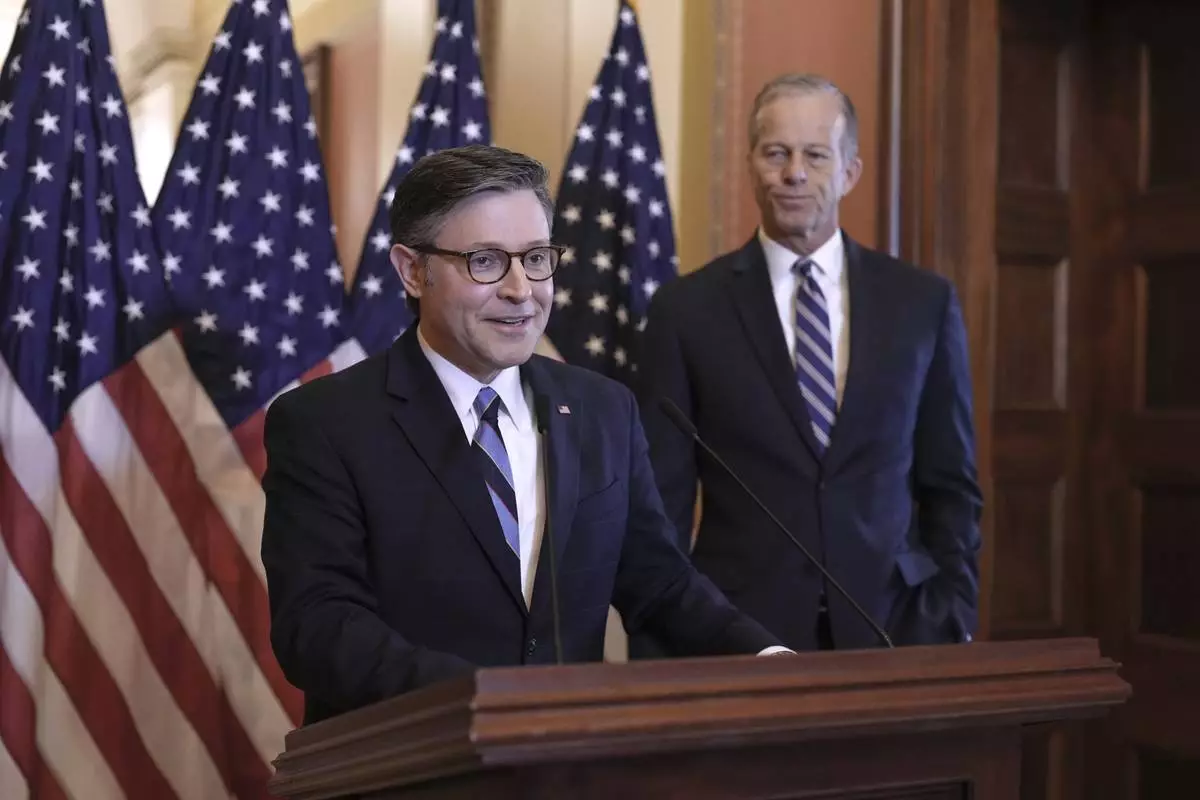
Speaker of the House Mike Johnson, R-La., left, and Senate Majority Leader John Thune, R-S.D., make statements to reporters ahead of vote in the House to pass a bill on President Donald Trump's top domestic priorities of spending reductions and tax breaks, at the Capitol in Washington, Thursday, April 10, 2025. (AP Photo/J. Scott Applewhite)
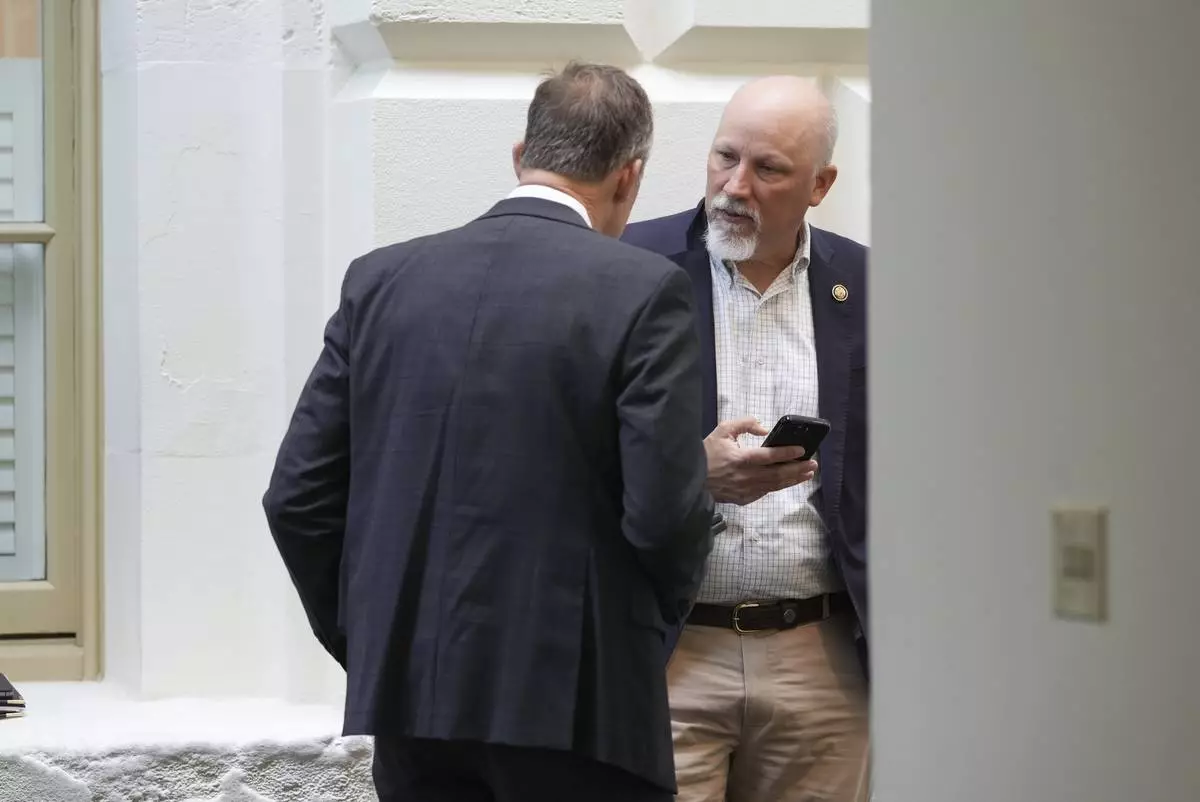
Rep. Chip Roy, R-Texas, right, and Rep. Scott Perry, R-Pa., members of the conservative House Freedom Caucus, meet outside of the closed-door House Republican Conference as Speaker of the House Mike Johnson, R-La., talks to fellow Republicans to push for a House-Senate compromise budget resolution to advance President Donald Trump's agenda, at the Capitol in Washington, Tuesday, April 8, 2025. (AP Photo/J. Scott Applewhite)
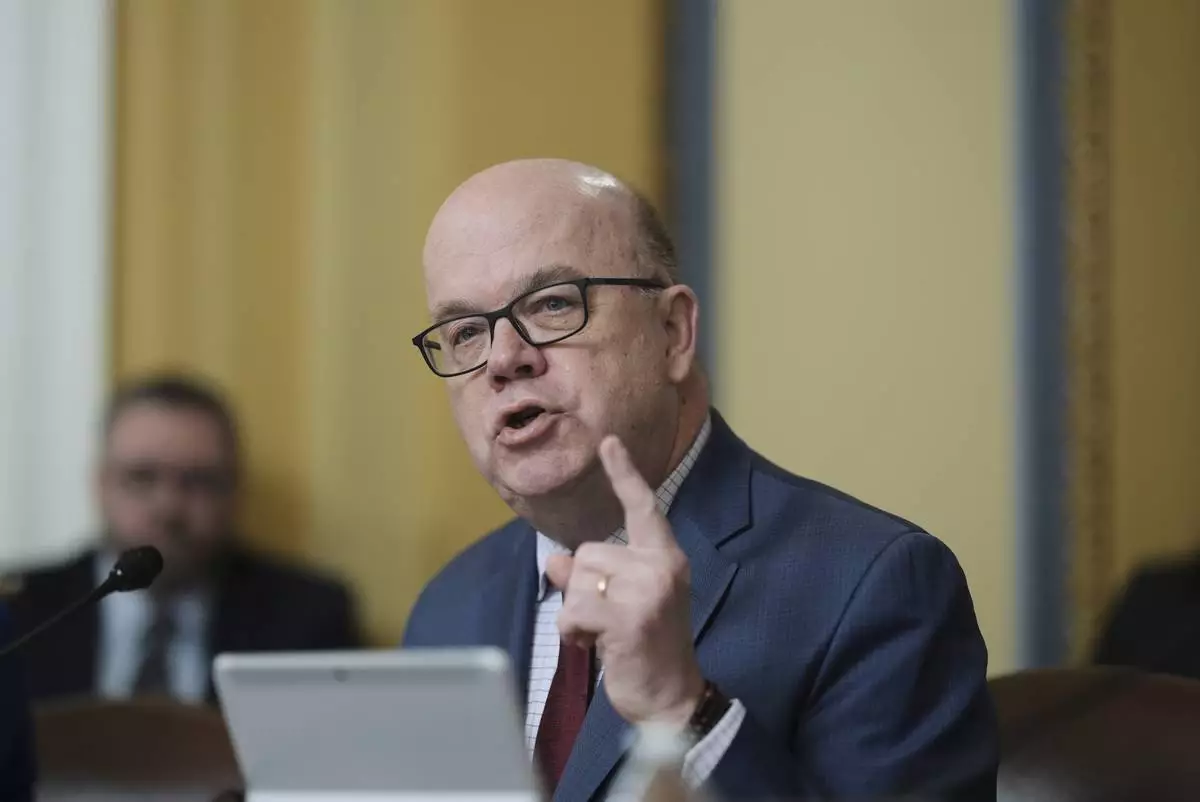
Rep. Jim McGovern, D-Mass., the ranking member of the House Rules Committee, challenges Budget Committee Chairman Jodey Arrington, R-Texas, as President Donald Trump's top domestic priorities on spending reductions and tax breaks are prepared for a floor vote, at the Capitol in Washington, Wednesday, April 9, 2025. (AP Photo/J. Scott Applewhite)
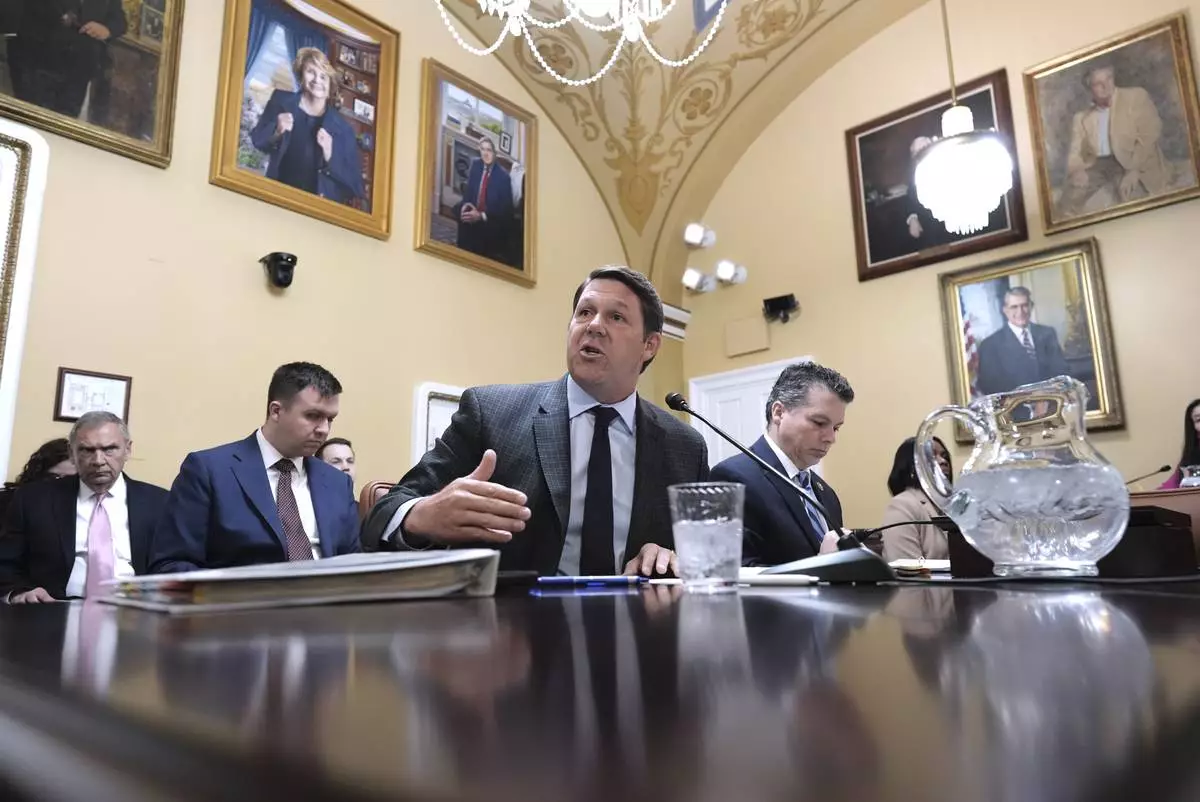
House Budget Committee Chairman Jodey Arrington, R-Texas, joined at right by Rep. Brendan Boyle, D-Pa., the ranking member, defends the Republican plan to advance President Donald Trump's top domestic priorities on spending reductions and tax breaks as the House Rules Committee prepares the measure for a floor vote, at the Capitol in Washington, Wednesday, April 9, 2025. (AP Photo/J. Scott Applewhite)

Speaker of the House Mike Johnson, R-La., leaves the chamber after an essential procedural vote passed in the House to advance President Donald Trump's top domestic priorities on spending reductions and tax breaks, at the Capitol in Washington, Wednesday, April 9, 2025. (AP Photo/J. Scott Applewhite)
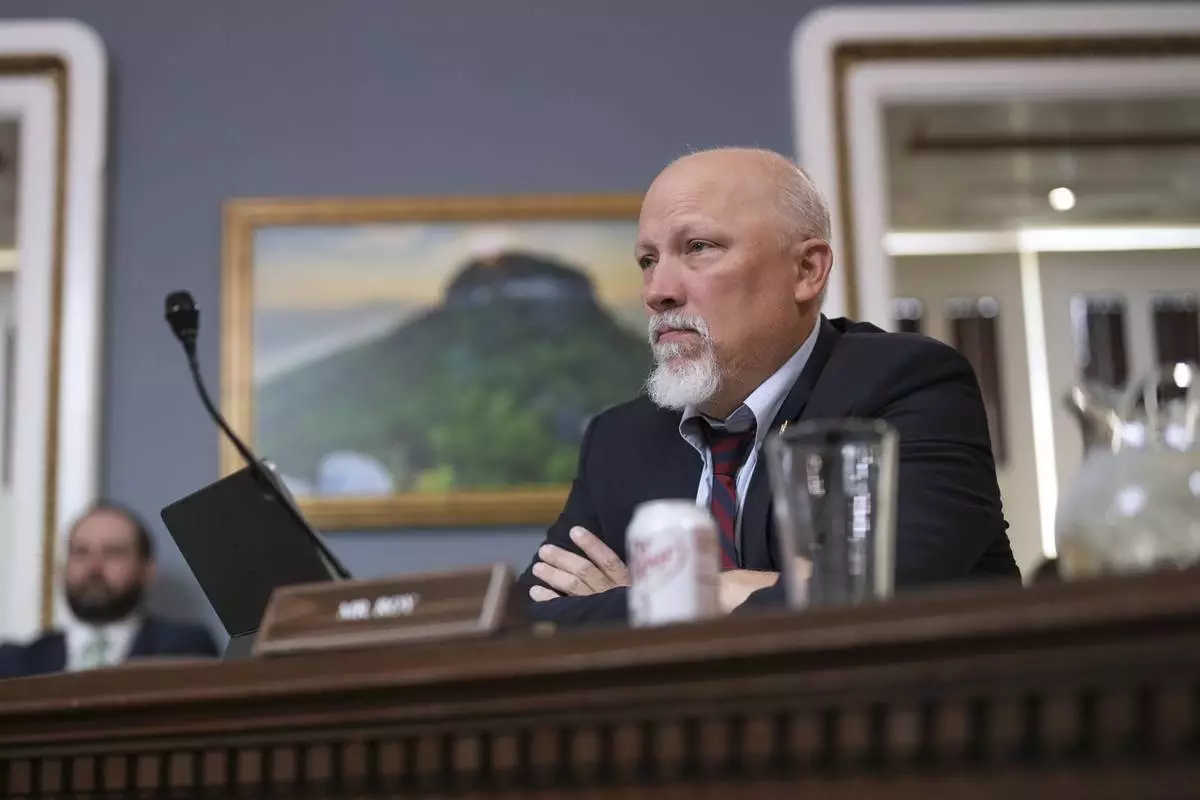
Rep. Chip Roy, R-Texas, a member of the conservative House Freedom Caucus, listens as the Republican plan to advance President Donald Trump's top domestic priorities on spending reductions and tax breaks is prepared in the House Rules Committee for a floor vote, at the Capitol in Washington, Wednesday, April 9, 2025. The deficit hawk has blasted the GOP plan drawing the ire of both Trump and House Speaker Mike Johnson. (AP Photo/J. Scott Applewhite)
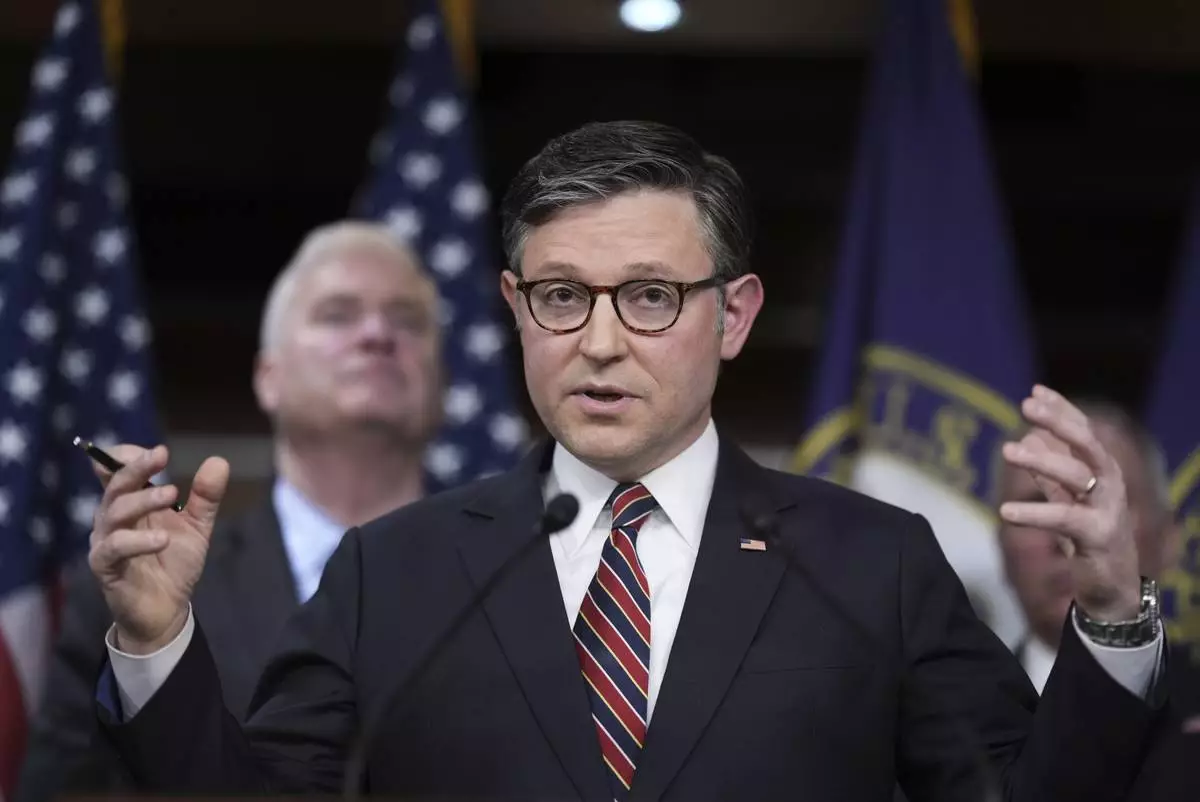
Speaker of the House Mike Johnson, R-La., talks to reporters about his push for a House-Senate compromise budget resolution to advance President Donald Trump's agenda, even with opposition from hard-line conservative Republicans, at the Capitol in Washington, Tuesday, April 8, 2025. (AP Photo/J. Scott Applewhite)





























